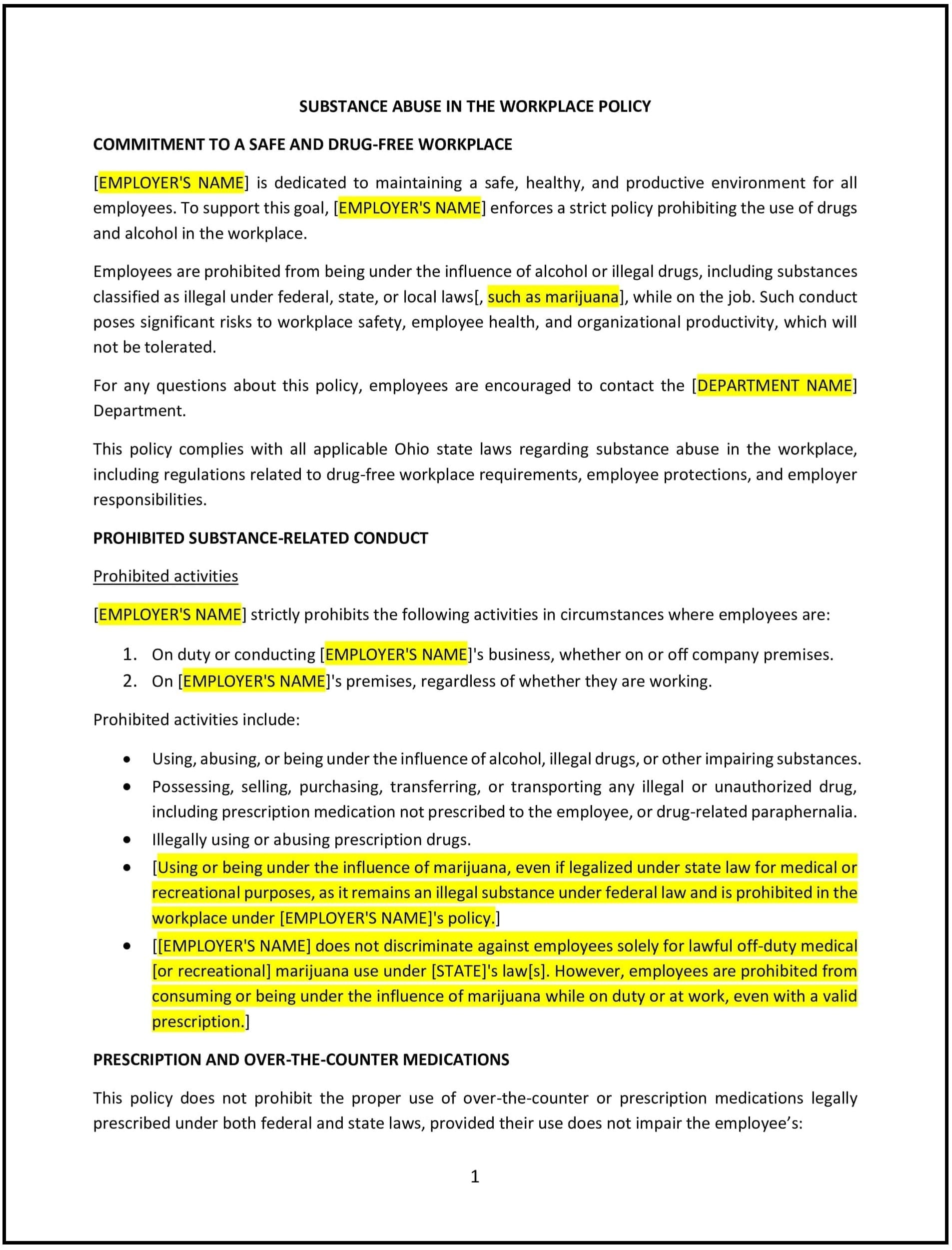Substance abuse in the workplace policy (Ohio): Free template
Got contracts to review? While you're here for policies, let Cobrief make contract review effortless—start your free review now.

Customize this template for free
Substance abuse in the workplace policy (Ohio)
A substance abuse in the workplace policy provides Ohio businesses with clear guidelines for managing substance abuse issues within the workplace, including the prevention, identification, and handling of substance use and its effects on employee performance and workplace safety. This policy outlines the company's stance on substance use, including drugs and alcohol, and defines prohibited behaviors, such as being under the influence at work. It also provides procedures for handling suspected substance abuse, offering support for employees seeking help, and ensuring that the workplace remains safe and productive.
By implementing this policy, Ohio businesses can maintain a safe, healthy, and productive environment while addressing substance abuse issues and providing support for employees in need of assistance.
How to use this substance abuse in the workplace policy (Ohio)
- Define substance abuse: The policy should define what constitutes substance abuse within the workplace, including the use of illegal drugs, prescription medication misuse, alcohol consumption, and the presence of substance impairment during work hours.
- Set clear prohibitions: The policy should clearly prohibit substance abuse at the workplace, including being under the influence of alcohol or drugs during work hours, while on business premises, or during work-related activities.
- Address legal substances: The policy should specify any legal substances, such as alcohol or prescription drugs, and clarify when their use may be deemed inappropriate or impair work performance, particularly if the employee is under the influence during work hours.
- Outline employee responsibilities: Employees should be informed of their responsibility to report any substance abuse issues, either for themselves or their colleagues, in order to maintain a safe and productive workplace.
- Provide a procedure for handling substance abuse: The policy should specify the steps for handling suspected substance abuse in the workplace, including how managers should address potential issues, whether substance testing is required, and how suspected impairment should be reported.
- Offer support and resources: The policy should include information on available employee assistance programs (EAPs), counseling, or support groups for employees seeking help with substance abuse issues. It should encourage employees to seek help before their condition affects their work performance.
- Specify disciplinary actions: The policy should outline the consequences for violating the substance abuse policy, which may include warnings, mandatory counseling, suspension, or termination, depending on the severity of the violation.
- Comply with legal requirements: The policy should comply with Ohio state laws and federal regulations, such as the Americans with Disabilities Act (ADA) and the Drug-Free Workplace Act, which may provide specific guidance on managing substance abuse issues within the workplace.
- Review and update regularly: The policy should be reviewed periodically to ensure it remains aligned with Ohio state laws, federal regulations, and the evolving needs of the business.
Benefits of using this substance abuse in the workplace policy (Ohio)
This policy provides several key benefits for Ohio businesses:
- Promotes a safe work environment: By addressing substance abuse, the policy helps maintain a safe workplace by reducing the risks associated with impaired performance, accidents, and unsafe behaviors.
- Reduces workplace accidents: By preventing substance abuse during work hours, the policy helps reduce the likelihood of accidents, injuries, and other safety-related issues that can result from impaired employees.
- Supports employee health and well-being: Offering support for employees struggling with substance abuse through counseling or rehabilitation services helps employees get the assistance they need, improving their health and work performance.
- Maintains productivity: By addressing substance abuse issues early on, the policy ensures that employees remain productive and focused on their tasks, minimizing disruptions caused by substance-related issues.
- Protects the business from legal risks: The policy helps businesses comply with Ohio state laws, federal regulations, and industry standards regarding substance abuse, reducing the risk of legal liabilities.
- Improves employee morale: A clear and fair substance abuse policy demonstrates that the business values employee well-being and is committed to providing a safe, supportive work environment.
- Reduces absenteeism: By offering help and support for employees facing substance abuse challenges, businesses can reduce absenteeism and improve retention, as employees are more likely to seek help before their problems escalate.
Tips for using this substance abuse in the workplace policy (Ohio)
- Communicate the policy clearly: Ensure that all employees are aware of the substance abuse policy by including it in the employee handbook, reviewing it during onboarding, and periodically reminding employees of the company's expectations and resources available for assistance.
- Train managers on handling substance abuse issues: Provide training to managers and HR personnel on how to identify potential substance abuse problems, address them respectfully, and refer employees to appropriate resources for support.
- Provide accessible support resources: Make it easy for employees to access support for substance abuse issues by offering employee assistance programs (EAPs), counseling services, or referrals to rehabilitation programs.
- Be consistent in enforcing the policy: The policy should be applied consistently across all employees to maintain fairness and accountability. Address any substance abuse concerns promptly and in accordance with the procedures outlined in the policy.
- Monitor workplace safety: Regularly assess workplace safety and take steps to ensure that employees are not working under the influence of substances that could impair their ability to perform tasks safely.
- Review the policy periodically: Regularly review the policy to ensure it aligns with Ohio state laws, federal regulations, and the evolving needs of the business. Update the policy as needed to reflect changes in laws or business practices.